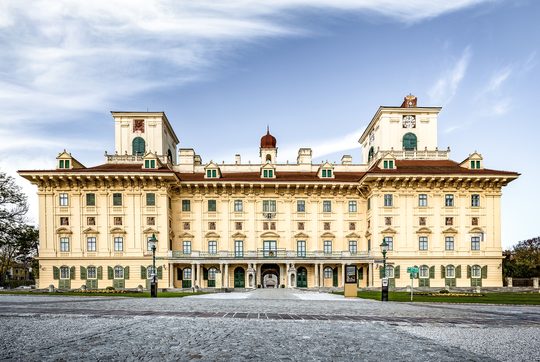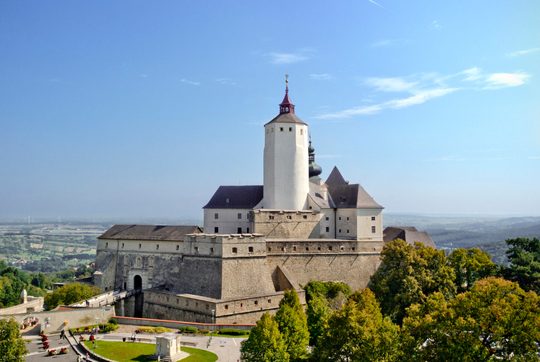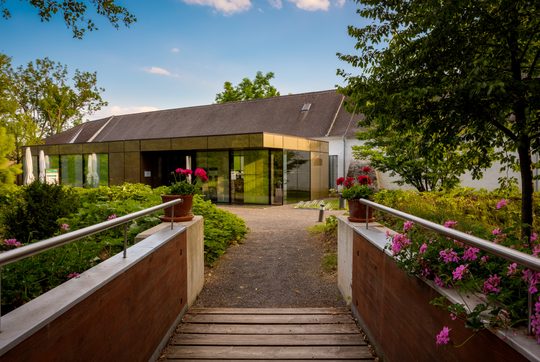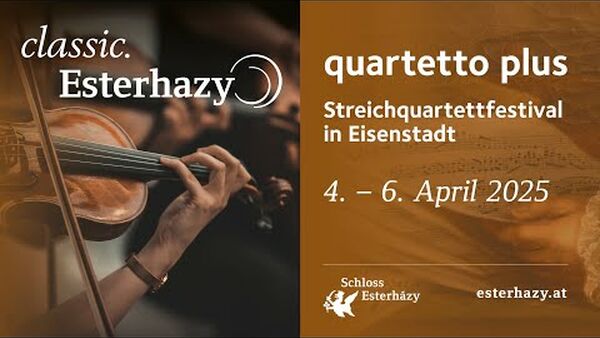quartetto plus
String Quartet days
April 4 - 6
4 April, 7:30 pm, Haydnsaal: Fandango
Cuarteto Casals
- Vera Martínez Mehner, violin
- Abel Tomàs Realp, violin
- Christina Cordero, viola
- Arnau Tomàs Realp, cello
Emanuele Buono, guitar
He too was a child prodigy, one with an even dramatically shorter life than Wolfgang Amadé: born exactly half a century after Mozart: the Basque composer Juan Crisóstomo de Arriaga was only granted twenty years. He used them, among other things, for an opera (at 13!), a symphony - and, last but not least, three magnificent string quartets, of which the Cuarteto Casals will play the third at this concert. The Catalan ensemble is bringing another work from its native Spain to Eisenstadt, even though its composer was a native Italian: Luigi Boccherini, who worked personally for the Spanish court as well as for the Prussian court, has with his quintet for guitar and string quartet not only make Spanish hearts beat faster - no wonder with this fiery fandango as the finale. At the beginning, Joseph Haydn with the last of his “Sun Quartets”: a fantastic start to quartetto plus 2025!
5 April, 6:00 pm, Empire hall: American Dream
Due to the great demand, the concert was moved to the Empiresaal
SIGNUM saxophone quartet
- Blaž Kemperle, soprano saxophone
- Jacopo Taddei, alto saxophone
- Alan Lužar, tenor saxophone
- David Brand, bariton saxophone
June 1893. Antonín Dvořák sought relaxation from his first season as conservatory director in a Czech rural community. But not in his old homeland, but in the idyllic immigrant village of Spillville in the US state of Iowa - because he had been persuaded to teach in New York. Shortly after the symphony “From the New World”, one of his most popular string quartets was created in less than two weeks, which unmistakably incorporates influences from the musical styles that fascinated Dvořák in the USA: not least spirituals. At the time, he was still publicly resented for the fact that he viewed black music as the country's true “folk music,” from which independent lessons could also be drawn for art music. The SIGNUM saxophone quartet continues to trace the genuinely “American” and the mutual enrichment in music - from George Gershwin and Leonard Bernstein to the present: This opens the ears and therefore also the hearts.
5 April, 8:00 pm, Haydnsaal: Dream Novella
Sebastian Koch, reading
Hubert Nuss Jazzquartett
- Hubert Nuss, piano
- Martin Gjakonovski, base
- Bastian Stein, trumpet
- Fabian Arends, drum
A marital crisis: a banal, everyday event? In 1925, exactly 100 years ago, Arthur Schnitzler literary examined a relationship that had gotten into trouble in a way that was new at the time. A doctor by profession and a writer with just as much diagnostic insight, Schnitzler deals with the unifying and dividing aspects between his characters Albertine and Fridolin in a captivating way - against the social background of his time and in harmony with the dream interpretation of his colleague Sigmund Freud. The Karlsruhe-born actor Sebastian Koch, celebrated and multiple award-winning for numerous roles in theater, film and television (“The Lives of Others”, “Speer and Er”, most recently “Shadow of the Murderers” and “Your Honor”), lends his unmistakable voice to reflect the nightly experiences of the two - and the Hubert Nuss Jazz Quartet translates the soul explorations into contemporary, timeless, emotional sounds.
6 April, 11:00 am, Haydnsaal: Sunrise
Aris Quartett
- Anna Katharina Wildermuth, violin
- Noémi Zipperling, violin
- Caspar Vinzens, viola
- Lukas Sieber, cello
Eckart Runge, cello
Is there a more wistful melody than the distant, three-part main theme of the Adagio from Franz Schubert's fantastic string quintet? The cantilena floats and flows strangely, caressed by the violin and cello - in the middle of a work that seems to go beyond the boundaries of chamber music, both in its external dimensions and in the spiritual depths it plumbs. None other than Eckart Runge joins the Esmé Quartet to perform the second cello part in this program, which of course starts with Joseph Haydn and then moves forward to the present day. Because after the “Sunrise” quartet with the elegantly rising gesture of the first violin, we listen to how the Korean composer Soo Yeon Lyuh rediscovered the traditional music of her homeland and creatively transformed it, and how blossomingly spring unfolds in a seasonal cycle by her Chinese-American colleague Kui Dong.






